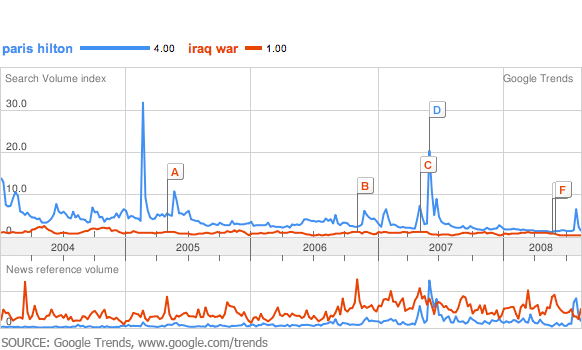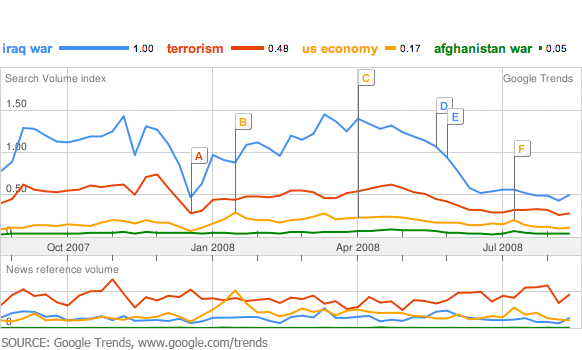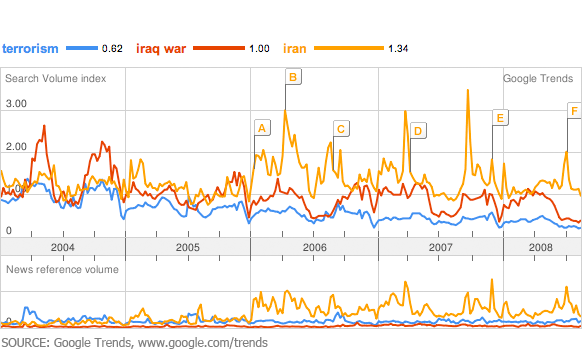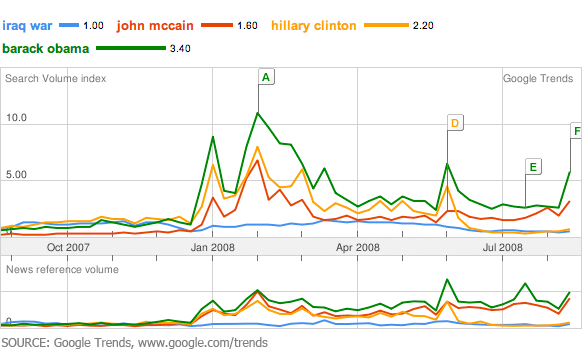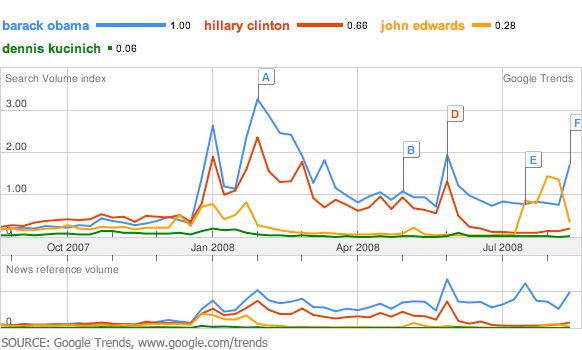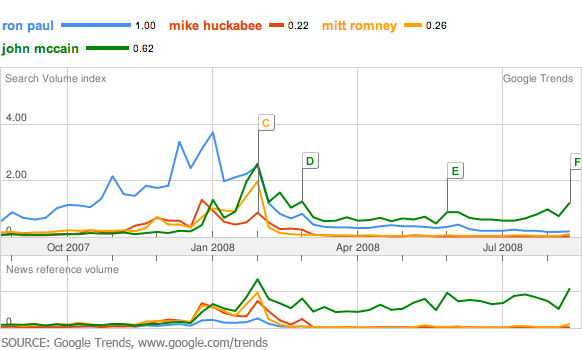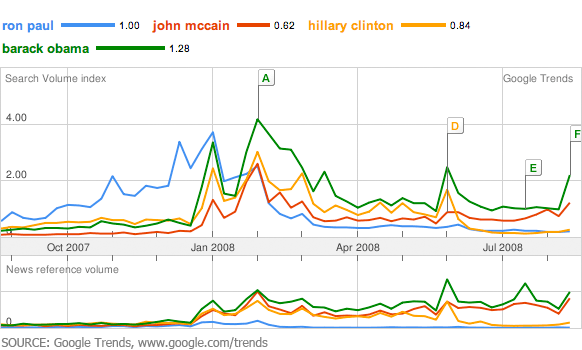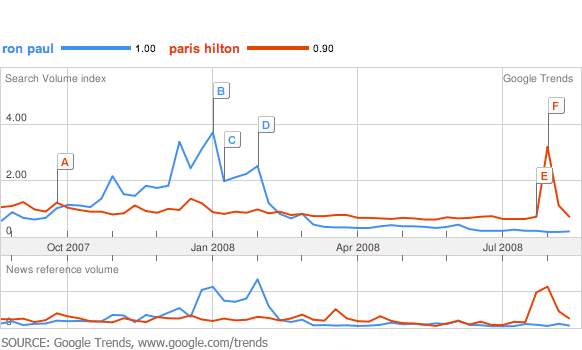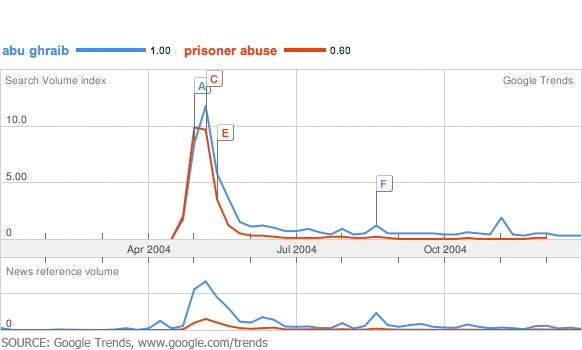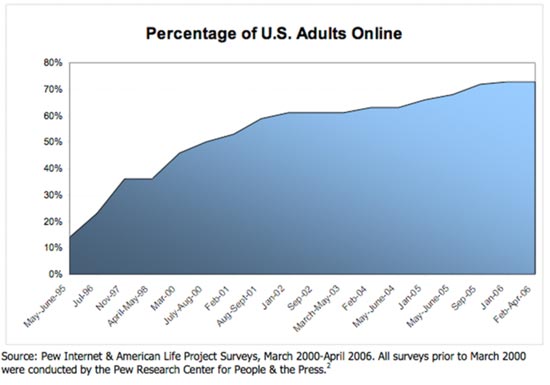It looks like you're using an Ad Blocker.
Please white-list or disable AboveTopSecret.com in your ad-blocking tool.
Thank you.
Some features of ATS will be disabled while you continue to use an ad-blocker.
share:
[pressimg]http://files.abovetopsecret.com/images/member/3fc6ed195b35.jpg[/pressimg] The U.S. media (broadcast, print, and major online news) has
evolved into a sophisticated system that shapes the nature of which topics are important in the culture at large. The system works so well, that it
has successfully killed the chances of a political candidate with phenomenal cultural buzz, in favor of candidates who will apparently result in an
election race with the highest potential for optimum ratings and revenue. As we examine what's going on, keep in mind this 2006 article from the
Washington Post: Money's Going to Talk in 2008.
Some months ago, I viewed a highly interesting video that compared Google Trends results of the various candidates. While I'm having difficulty recalling the source of the video, it's been a curiously enticing observation in the back of my mind for some time. For those who are unfamiliar with Google Trends, it provides an interesting look into the popularity of select keywords and phrases, based on Internet searches, and comparing those with the frequency of occurrence in online news sources. It provides a handy way to compare cultural zeitgeist and Internet meme against mainstream news... a means far more accurate than any political polling system as it reviews the search habits of millions of people every day.
Here is an example of comparing a name (Paris Hilton) that is wildly popular in the contemporary cultural lexicon to a news term (Iraq War) with a high frequency of occurrence.
You can clearly get a sense, over the past five years, how the celebrity, "Paris Hilton", has become very popular within the culture, more so than interest in information about the Iraq war -- despite a much higher frequency of occurrence of Iraq war-related news. (The news reference volume graph is vertically compressed as compared to the search volume, so the scale will be different.) The key here is to illustrate how a term (person in this case) is popular within the culture, and how that popularity can transcend news coverage.
With this in mind, we can query Google Trends and examine a conspiratorial angle long discussed on sites such as ATS, under-coverage of the Iraq War.
This graph clearly shows that the Internet culture/zeigeist is far more interested in what's happing in relation to the "War in Iraq" than they are in "terrorism". However, the news organizations strive to ensure we're more concerned about "terrorism" and the "economy" than the invasion and war in another country. This is a fine example of how the currents of the culture may run contrary to what is being reported in mainstream news.
Similar results are seen when we examine Iran in the news and culture.
The topics of terrorism and Iran are getting significantly more coverage in mainstream news sources... with a heavy influence on cultural buzz related to Iran.
Now let us compare how news of the war fares with the front-running/popular presidential candidates with the buzz in the culture.
Not really much of a surprise here, is there? As soon as the mainstream media places more importance on the three "most-news-worthy" candidates, the cultural buzz of Internet searches sways away from the war, and toward the candidates. An interesting item is that peak for Mr. Obama in both news and culture, I wonder if it has anything to do with his March 2008 fundraising performance? Let's keep that thought in mind as we move forward.
Let's redirect our focus to the front-running Democrat candidates for the 2008 presidential election.
The large scale of the post-January peaks distort some of the early comparisons, but it's exceptionally clear that Hillary Clinton is the more popular candidate in regards to early cultural awareness. Mrs. Clinton's cultural popularity through Internet searches leads the other candidates by an apparent wide margin... that is, until news of Obama's improved fund-raising hits, and the media delivers more attention to Obama than Clinton. This comparison graph shows a very clear trend, once the news focuses on a candidate, the candidate who was previously popular in the broader culture begins to loose their buzz advantage. This is an important observation to keep in mind when we review the republican candidates.
Here is where it all gets exceptionally interesting for those who consider contemporary conspiracies, the republican candidates, and the cultural buzz surrounding Ron Paul.
Here we see a stunning manipulation of cultural meme/zeitgeist by mainstream media -- the burying of Ron Paul. We who follow events of conspiratorial nature know well the unprecedented cultural popularity of Ron Paul going into December of 2008. This graph shows a stunning cultural awareness of Mr. Paul through an amazing amount of online searches, contrasted by an equally stunning lack of news coverage. But... surprise, surprise... Mr. McCain experiences an exceptional peak from mainstream news, that just happens to coincide with information that he's the leading Republican candidate when it comes to funds raised. Or at least... that's what you've been told to think -- Ron Paul was actually the most successful fund-raiser for the period.
Here is an opportune moment to pause and reflect. Based on available data and an analysis of the cultural awareness, Ron Paul heads into early 2008 with both a fund-raising and verifiably unprecedented cultural advantage. Unfortunately, he's unfit for promotion by the mainstream news for some unknown reason, and as news coverage increases for other Republican candidates, the cultural buzz for Ron Paul begins to fade.
With that in mind, let's lump Ron Paul in with the other three candidates the mainstream news has told us are the clear front-runners.
At the very moment the mainstream media begins its first peak with Barack Obama, Ron Paul takes his first dramatic hit in the cultural department. Paul's next big cultural awareness loss directly coincides with news coverage peaks focused on the other three candidates. As the months wear on, and the mainstream news tells us there are only three, Ron Paul continues to fade... despite having a near twenty-to-one cultural advantage prior to January of 2008.
These clearly illustrated trends indicate two media-related conspiracies of this 2008 election season.
Conspiracy One: The Burying of Ron Paul Long speculated as a multi-faced conspiracy of the "Powers That Be" controlling aspects of the "Mainstream Media", the candidate with a lead in both cultural awareness and fundraising is systematically removed from the cultural buzz surrounding US politics. And while some nay-sayers may speculate that Ron Paul's popularity was artificial as a result of bloggers and Google-bombers, consider this:
Among the millions of US Internet users conducting searches on Google every day, Ron Paul was more popular than Paris Hilton between October of 2007 and mid-March of 2008.
Conspiracy Two: The Media Has Selected Your Final Candidates For You Despite excellent opinions, policies, and platforms from several candidates in late 2007 and early 2008, the news media coverage focused heavily on the three (non-Paul) candidates with the deepest pockets -- or in other words, the three candidates best-positioned to spend the most on advertising. News coverage of the candidates had nothing to do with who had the more aggressive platform, security strategy, or economic plan, and everything to do with who is able to commit to more advertising.
DISCLAIMER: Before you dismiss this as another lament for the lost opportunities of the Ron Paul campaign, the data speaks for itself. I personally am no fan of Mr. Paul and many of his positions. However, one cannot ignore the stunning wave of cultural resonance apparently inspired by his refreshing straight talk.
(added requested change to thread title)
[edit on 25-8-2008 by SkepticOverlord]
Some months ago, I viewed a highly interesting video that compared Google Trends results of the various candidates. While I'm having difficulty recalling the source of the video, it's been a curiously enticing observation in the back of my mind for some time. For those who are unfamiliar with Google Trends, it provides an interesting look into the popularity of select keywords and phrases, based on Internet searches, and comparing those with the frequency of occurrence in online news sources. It provides a handy way to compare cultural zeitgeist and Internet meme against mainstream news... a means far more accurate than any political polling system as it reviews the search habits of millions of people every day.
Here is an example of comparing a name (Paris Hilton) that is wildly popular in the contemporary cultural lexicon to a news term (Iraq War) with a high frequency of occurrence.
You can clearly get a sense, over the past five years, how the celebrity, "Paris Hilton", has become very popular within the culture, more so than interest in information about the Iraq war -- despite a much higher frequency of occurrence of Iraq war-related news. (The news reference volume graph is vertically compressed as compared to the search volume, so the scale will be different.) The key here is to illustrate how a term (person in this case) is popular within the culture, and how that popularity can transcend news coverage.
With this in mind, we can query Google Trends and examine a conspiratorial angle long discussed on sites such as ATS, under-coverage of the Iraq War.
This graph clearly shows that the Internet culture/zeigeist is far more interested in what's happing in relation to the "War in Iraq" than they are in "terrorism". However, the news organizations strive to ensure we're more concerned about "terrorism" and the "economy" than the invasion and war in another country. This is a fine example of how the currents of the culture may run contrary to what is being reported in mainstream news.
Similar results are seen when we examine Iran in the news and culture.
The topics of terrorism and Iran are getting significantly more coverage in mainstream news sources... with a heavy influence on cultural buzz related to Iran.
Now let us compare how news of the war fares with the front-running/popular presidential candidates with the buzz in the culture.
Not really much of a surprise here, is there? As soon as the mainstream media places more importance on the three "most-news-worthy" candidates, the cultural buzz of Internet searches sways away from the war, and toward the candidates. An interesting item is that peak for Mr. Obama in both news and culture, I wonder if it has anything to do with his March 2008 fundraising performance? Let's keep that thought in mind as we move forward.
Let's redirect our focus to the front-running Democrat candidates for the 2008 presidential election.
The large scale of the post-January peaks distort some of the early comparisons, but it's exceptionally clear that Hillary Clinton is the more popular candidate in regards to early cultural awareness. Mrs. Clinton's cultural popularity through Internet searches leads the other candidates by an apparent wide margin... that is, until news of Obama's improved fund-raising hits, and the media delivers more attention to Obama than Clinton. This comparison graph shows a very clear trend, once the news focuses on a candidate, the candidate who was previously popular in the broader culture begins to loose their buzz advantage. This is an important observation to keep in mind when we review the republican candidates.
Here is where it all gets exceptionally interesting for those who consider contemporary conspiracies, the republican candidates, and the cultural buzz surrounding Ron Paul.
Here we see a stunning manipulation of cultural meme/zeitgeist by mainstream media -- the burying of Ron Paul. We who follow events of conspiratorial nature know well the unprecedented cultural popularity of Ron Paul going into December of 2008. This graph shows a stunning cultural awareness of Mr. Paul through an amazing amount of online searches, contrasted by an equally stunning lack of news coverage. But... surprise, surprise... Mr. McCain experiences an exceptional peak from mainstream news, that just happens to coincide with information that he's the leading Republican candidate when it comes to funds raised. Or at least... that's what you've been told to think -- Ron Paul was actually the most successful fund-raiser for the period.
Here is an opportune moment to pause and reflect. Based on available data and an analysis of the cultural awareness, Ron Paul heads into early 2008 with both a fund-raising and verifiably unprecedented cultural advantage. Unfortunately, he's unfit for promotion by the mainstream news for some unknown reason, and as news coverage increases for other Republican candidates, the cultural buzz for Ron Paul begins to fade.
With that in mind, let's lump Ron Paul in with the other three candidates the mainstream news has told us are the clear front-runners.
At the very moment the mainstream media begins its first peak with Barack Obama, Ron Paul takes his first dramatic hit in the cultural department. Paul's next big cultural awareness loss directly coincides with news coverage peaks focused on the other three candidates. As the months wear on, and the mainstream news tells us there are only three, Ron Paul continues to fade... despite having a near twenty-to-one cultural advantage prior to January of 2008.
These clearly illustrated trends indicate two media-related conspiracies of this 2008 election season.
Conspiracy One: The Burying of Ron Paul Long speculated as a multi-faced conspiracy of the "Powers That Be" controlling aspects of the "Mainstream Media", the candidate with a lead in both cultural awareness and fundraising is systematically removed from the cultural buzz surrounding US politics. And while some nay-sayers may speculate that Ron Paul's popularity was artificial as a result of bloggers and Google-bombers, consider this:
Among the millions of US Internet users conducting searches on Google every day, Ron Paul was more popular than Paris Hilton between October of 2007 and mid-March of 2008.
Conspiracy Two: The Media Has Selected Your Final Candidates For You Despite excellent opinions, policies, and platforms from several candidates in late 2007 and early 2008, the news media coverage focused heavily on the three (non-Paul) candidates with the deepest pockets -- or in other words, the three candidates best-positioned to spend the most on advertising. News coverage of the candidates had nothing to do with who had the more aggressive platform, security strategy, or economic plan, and everything to do with who is able to commit to more advertising.
DISCLAIMER: Before you dismiss this as another lament for the lost opportunities of the Ron Paul campaign, the data speaks for itself. I personally am no fan of Mr. Paul and many of his positions. However, one cannot ignore the stunning wave of cultural resonance apparently inspired by his refreshing straight talk.
(added requested change to thread title)
[edit on 25-8-2008 by SkepticOverlord]
excellant investigation old school
on one hand, its nice to see actual tangible evidence that the media has a direct effect on cultural awareness
on the other hand, its frightening to know that they do have this power!
flagged and starred
its research threads like this that make ATS rock so hard,
thanks agian old school
on one hand, its nice to see actual tangible evidence that the media has a direct effect on cultural awareness
on the other hand, its frightening to know that they do have this power!
flagged and starred
its research threads like this that make ATS rock so hard,
thanks agian old school
Nice research Old School!
This is what ATS is all about.
I guess we can forgo all of the "show me the evidence" posts in this thread.
My only reservation is linked to the observation that the numbers come from Google who are in and of themselves a suspect organisation IMO. I wouldn't be surprised if this kind of analysis is somehow limited in the future.
Have you thought about any externalities that may come into play?
There's some famous examples of erroneous analysis linked to early polling when the telephone first became widespread where only the "well off" would be represented in the numbers but the result would reflect the masses.
In this case we are strictly looking at a "net savvy" cohort. It should also be noted that any polling data today does NOT include cell phones which leaves out the younger generation's view. Perhaps the Internet can substitute for this oversight?
.
This is what ATS is all about.
I guess we can forgo all of the "show me the evidence" posts in this thread.
My only reservation is linked to the observation that the numbers come from Google who are in and of themselves a suspect organisation IMO. I wouldn't be surprised if this kind of analysis is somehow limited in the future.
Have you thought about any externalities that may come into play?
There's some famous examples of erroneous analysis linked to early polling when the telephone first became widespread where only the "well off" would be represented in the numbers but the result would reflect the masses.
In this case we are strictly looking at a "net savvy" cohort. It should also be noted that any polling data today does NOT include cell phones which leaves out the younger generation's view. Perhaps the Internet can substitute for this oversight?
.
Originally posted by Gools
Have you thought about any externalities that may come into play?
In the original post, I thought it best to focus on the delivery of data that speaks for itself, and make a minimal number of conclusions.
At this point, in 2008, the culture is very different from the previous election seasons of 2004 and 2000 where it could be said an "Internet component" was observable.
In 2000, the Internet was young. However, Matt Drudge's exposure of the Monica Lewinsky scandal via the Internet played well into the Republican strategy.
While the Internet was more sophisticated in 2004, it had not yet become the primary source of news for most Americans. The rapid deployment of the swift boat controversy owes itself to savvy conservative bloggers of the day, but it [Internet] was not yet a strategic tool of manipulation.
Here, in these clear graphs, we can see how the Internet is currently being manipulated to favor the right candidates with ready funding to spend on advertising. There may be more and better coverage (I suspect there is) of the full spectrum of candidates within offline media, but given the dismal circulation numbers of major newspapers and news magazines of late, we can surmise those sources barely matter.
In 2008, the culture and the Internet are one. In 2008, manipulation of opinion has shifted from broadcast media to online media.
In this case we are strictly looking at a "net savvy" cohort.
We're looking at Google users in the United States. Given the now massive penetration of Internet access throughout the country, we can begin to draw conclusions based on the massive data-set provided here. The classic definition of a "net savvy" person stopped being a minority in mid-2006, and in mid-2008 is a clear majority as well as an opinion influencer amongst their circle of friends.
Excellent research, mister.old.school.
I am also intrigued by the very low rating Kucinich had/has. Despite his very important and nationally relevant impeachment proposal, he was next to non-existant in the eyes of the populace! I think that is an incredibly important piece of information there.
With regards to the candidates, it should also be noted that the candidates are usually very affluent.
And it has been said a couple of times here on ATS, but the Bush/Clinton 'dynasty' was very likely not an accident at all (remember Hilary is still a very strong political prescence). 20 years in a row with either a Bush or Clinton.
I am also intrigued by the very low rating Kucinich had/has. Despite his very important and nationally relevant impeachment proposal, he was next to non-existant in the eyes of the populace! I think that is an incredibly important piece of information there.
With regards to the candidates, it should also be noted that the candidates are usually very affluent.
And it has been said a couple of times here on ATS, but the Bush/Clinton 'dynasty' was very likely not an accident at all (remember Hilary is still a very strong political prescence). 20 years in a row with either a Bush or Clinton.
starred and flagged.
Amazing job on the post Old School.
Amazingly Scary, information you've just dropped as well. I often wonder why all of the sudden out of nowhere a few months ago, this turned into a 3 person election, well now 2. The media has so much damn power, and they wield it so blatantly, it's nearly sickening.
Between Television and radio, you are right, the MSM has basically chosen for us. No one is even gonna bother to go to even cast a vote for someone other than Obama or McCain at this point, because they know it won't make crap a difference.
I have a feeling this election will have a very low turn out of voters. I wait to see the numbers, but I often wonder if we'll even be given the correct ones.
Amazing job on the post Old School.
Amazingly Scary, information you've just dropped as well. I often wonder why all of the sudden out of nowhere a few months ago, this turned into a 3 person election, well now 2. The media has so much damn power, and they wield it so blatantly, it's nearly sickening.
Between Television and radio, you are right, the MSM has basically chosen for us. No one is even gonna bother to go to even cast a vote for someone other than Obama or McCain at this point, because they know it won't make crap a difference.
I have a feeling this election will have a very low turn out of voters. I wait to see the numbers, but I often wonder if we'll even be given the correct ones.
McCain was a sponsor of McCain-Feingold campaign finance laws which limits the amount people can donate to $2300 per person.
What this law actually did was give the media even more power over the elections. The media runs 24 hour coverage of the candidates of their choosing. They even have people come in and defend the individual candidates in the arguments. All day long, every day.
Meanwhile, take a candidate like Ron Paul who has to spend millions for a tiny 30 second advertisement, of which is during the time when most people are getting drinks and going to the bathroom.
The media candidates receive "donations" from the media that goes well beyond $2300 per person. Yet if you support a candidate like Ron Paul then you do not get such donations. Instead of having people who are there to debate every single point someone makes about them, Ron Paul is left to media personalities who attack him most of the time with no defense, and often times from both "sides" of the argument. Like Fox News saying anyone who supports him has a virus or something. WTF?
McCain gets these campaign laws passed which give huge amounts of power to the media over the election. And then he happens to win the next nomination while getting minimal support to say the least? Support that is so low he needed to take out loans and couldn't even follow his own laws?
Not to mention the fact that the $2300 doesn't even take into account inflation. So the amount of money people are able to give just keeps getting less and less valuable, while the corporate media is able to keep giving away all the support they want.
What this law actually did was give the media even more power over the elections. The media runs 24 hour coverage of the candidates of their choosing. They even have people come in and defend the individual candidates in the arguments. All day long, every day.
Meanwhile, take a candidate like Ron Paul who has to spend millions for a tiny 30 second advertisement, of which is during the time when most people are getting drinks and going to the bathroom.
The media candidates receive "donations" from the media that goes well beyond $2300 per person. Yet if you support a candidate like Ron Paul then you do not get such donations. Instead of having people who are there to debate every single point someone makes about them, Ron Paul is left to media personalities who attack him most of the time with no defense, and often times from both "sides" of the argument. Like Fox News saying anyone who supports him has a virus or something. WTF?
McCain gets these campaign laws passed which give huge amounts of power to the media over the election. And then he happens to win the next nomination while getting minimal support to say the least? Support that is so low he needed to take out loans and couldn't even follow his own laws?
Not to mention the fact that the $2300 doesn't even take into account inflation. So the amount of money people are able to give just keeps getting less and less valuable, while the corporate media is able to keep giving away all the support they want.
reply to post by Nola213
Certainly this is a problem. There should be some manner of censorship. The media sets the tone for the popular vote. If they don't want them, they find all who oppose and hype up the opposition. I don't think that this race has been so slanted by the press, but as soon as some dirt is found out about either, expect a big "boo" sign to come flashing over the tube followed by the candidates name.
Certainly this is a problem. There should be some manner of censorship. The media sets the tone for the popular vote. If they don't want them, they find all who oppose and hype up the opposition. I don't think that this race has been so slanted by the press, but as soon as some dirt is found out about either, expect a big "boo" sign to come flashing over the tube followed by the candidates name.
i'm not trying to detract, but it's imho important to take time into account.
i know i watched a few RP related videos and maybe even did a search, which ma yor may not be reflected by google data, but i also stopped at a point.
once people got their data, why would they continue searching on a large scale? all the graphs really show is that people who are more interested in politics favor Ron Paul (unsurprisingly i might add), while people who have to be groomed to vote need media blizz before they even contemplate such a thing. constant media barrage reaches more and more people over time and if you looked at the area below the (distorted, but the trend is clear) graphs, you'll see that the mainstream outnumbers us and wins every vote. the media conglomerate is therefore instrumental in herding the voting cattle into the box, stampeding the rest, while the timeline can be understood when you consider that the media covers a vote only shortly before it's held (no need to think is there, so no time required) and people rightly lost a lot of interest once RP fell trough the primaries.
ie. if someone managed to disable these 'news' networks, only politically interested people would participate after a while and in these situations, Ron Paul would stand a chance.
i know i watched a few RP related videos and maybe even did a search, which ma yor may not be reflected by google data, but i also stopped at a point.
once people got their data, why would they continue searching on a large scale? all the graphs really show is that people who are more interested in politics favor Ron Paul (unsurprisingly i might add), while people who have to be groomed to vote need media blizz before they even contemplate such a thing. constant media barrage reaches more and more people over time and if you looked at the area below the (distorted, but the trend is clear) graphs, you'll see that the mainstream outnumbers us and wins every vote. the media conglomerate is therefore instrumental in herding the voting cattle into the box, stampeding the rest, while the timeline can be understood when you consider that the media covers a vote only shortly before it's held (no need to think is there, so no time required) and people rightly lost a lot of interest once RP fell trough the primaries.
ie. if someone managed to disable these 'news' networks, only politically interested people would participate after a while and in these situations, Ron Paul would stand a chance.
It honestly never occurred to me that the MSM would pick the candidates with the most money to simply sell more advertising. I'm not 100% sure what
to think about this, other than there is a certain amount of brilliance involved in pointing this out.
It's is totally conceivable that this may be a large part of the reason, but not all of it. I think without a doubt, and graphic representations from Google, that it should be fairly obvious that the media steers the entire candidate selection process. Who steers the media is the real question! I still believe that the main reason is to ensure the selection of candidates who are bought and sold and that will continue straight ahead with the plans of the government/corporate interests that they serve.
But, hell of a good post. I like your thinking!
It's is totally conceivable that this may be a large part of the reason, but not all of it. I think without a doubt, and graphic representations from Google, that it should be fairly obvious that the media steers the entire candidate selection process. Who steers the media is the real question! I still believe that the main reason is to ensure the selection of candidates who are bought and sold and that will continue straight ahead with the plans of the government/corporate interests that they serve.
But, hell of a good post. I like your thinking!
I was just thinking about this last night. My question:
If the media does have control over the outcome (which I agree with), then with the amount of publicity that Hillary has been given, why was she not considered more as vice president? Maybe it doesn't work that way, but it's just curious.
If the media does have control over the outcome (which I agree with), then with the amount of publicity that Hillary has been given, why was she not considered more as vice president? Maybe it doesn't work that way, but it's just curious.
The Media. Bought, Sold, & Controlled, by a very few people or corporations. They decide what we see and hear. They decide what we search the net for.
IE if you do not hear about a candidate or news item you will not search the net to learn more about the item or candidate. If you would ask around
people will tell you Ron Paul is a Nut! Then I ask them why do you think that? and they say ….cause he just is, I saw it on TV. End of
Searches…
What happened to RP? The Media happened! Big Money, Corporate control and the Powers that be.
My van still displays a vinyl graphic on the rear window… Don’t let the Media decide.. Think for Yourself …Ron Paul for President 2008. it will remain till after the elections and of course the Rally for the Republic
rally.campaignforliberty.com...
What happened to RP? The Media happened! Big Money, Corporate control and the Powers that be.
My van still displays a vinyl graphic on the rear window… Don’t let the Media decide.. Think for Yourself …Ron Paul for President 2008. it will remain till after the elections and of course the Rally for the Republic
rally.campaignforliberty.com...
Quite interesting...On ATS, I've been saying for years (since 2003, near the end of my OP in
Future Shock) that since the advent of the internet, this is the first time in history
that the "common man" has had access to information that puts us on a par with the Ruling Elite. Even though the thread discusses this in general
terms & is dispersed throughout the span of human history, the OP brings my previous historical studies up to the current time...In good detail, I
might add.
The whole crux of their rulership relies on information...Who has it & who controls where it spreads. Throughout history, the ruling elite used information (& propaganda) against the masses of people that they've ruled over. Their whole linchpin on control has been the illusion that they disperse to the masses while hording the truth for themselves...They simply cannot maintain control any other way & that's why it's an illusion.
Since the advent of public-access internet, now the "common man" has equal footing in the War FOR Information. The "Ruling Elite" are having trouble keeping their advantage in this particular war and they know it...Why else would there be such a big rush to push for tyranny in the once-free USA? Why is China seemingly being groomed to take the US's place as the pre-eminent superpower in production & economy (since the US's capability in those areas has been receding, China's is increasing)?
Through the beginning of American history up until near the end of the Cold War Era, the Ruling Elite has been moving slowly & carefully, keeping their machinations under wraps...The biggest & swiftest changes in the US government have only been coming to light over the past 2 or 3 decades: They've been moving more swiftly during these last decades because they know they're losing control over the spread of information. Gee, that's about the same time the wider public has been getting on the internet, hasn't it? Coincidence or not?...You decide.
So how can we possibly underestimate the effect the internet has played in public self-education, as compared to Government/Corporate-sponsored education in the public & private schools? So how can we possibly underestimate the importance of keeping the internet free & neutral, protected against the worldwide Governments' (& Corporates') interference & censorship?
Actually, no. Censorship is not the answer because it's a violation of the 1st Amendment...What really needs to be removed is the bias on money/politics & enforce equal time/consideration for all avenues of the real news that counts. This isn't a matter of censorship...It's the restoration of balance.
Which is why there must be a balance restored in the media. It won't be easy to do, especially when you know that the top 5 or 6 Media Corps control the vast majority of the actual broadcasting outlets. Whatever information the top honchos don't want to be broadcast will only see the light of day through the smaller, independent outlets. This is already a form of censorship...Subtle, but very effective.
In truth, the general public needs to take more interest in self-education...But only the small, more independent outlets (like ATS for example) try to do that. I mean, even as big as ATS is & the large number of "self-educators" that appear here, it must be admitted that ATS doesn't have anywhere near the same class of sheer influence possessed by the huge media corps. Just as Ron Paul achieved most of his success through "grass roots" & internet support, so to must the "self-educated" do the same...Many people do start promoting self-education this way & there are increasing numbers of people who do start self-educating...But are these numbers growing fast enough to make a difference in the destiny laid out for humanity by the "Ruling Elite?" Only time will tell, but with the speed of the US sliding into tyranny, how much time is left?
"Educate and inform the whole mass of the people... They are the only sure reliance for the preservation of our liberty."
"Enlighten the people generally, and tyranny and oppressions of body and mind will vanish like evil spirits at the dawn of day." -- both quotes by Thomas Jefferson
I think the question is not who steers the media, the question is what steers the media? Think about it for a second...Big Corporations look at one thing only: Money. So which candidates got the most advertising & who gets promoted the most? The candidates who had the most money for expensive TV advertising. This was a point already noted in this thread.
It was already noted that McCain took out a loan to buy more advertising...Hillary had to borrow money because she'd actually overspent what money she had. So that brings up another question...Do we really want someone in Office who's going to increase government spending, with the deficit being already out-of-control ?!
Ron Paul fell back on grass roots & internet...Far less expensive than television!
BTW, Ron Paul has decided on the schedule & guest appearances at the Liberty Campaign...For anyone who's interested...
Good OP, Old School...Star & Flag.
The whole crux of their rulership relies on information...Who has it & who controls where it spreads. Throughout history, the ruling elite used information (& propaganda) against the masses of people that they've ruled over. Their whole linchpin on control has been the illusion that they disperse to the masses while hording the truth for themselves...They simply cannot maintain control any other way & that's why it's an illusion.
Since the advent of public-access internet, now the "common man" has equal footing in the War FOR Information. The "Ruling Elite" are having trouble keeping their advantage in this particular war and they know it...Why else would there be such a big rush to push for tyranny in the once-free USA? Why is China seemingly being groomed to take the US's place as the pre-eminent superpower in production & economy (since the US's capability in those areas has been receding, China's is increasing)?
Through the beginning of American history up until near the end of the Cold War Era, the Ruling Elite has been moving slowly & carefully, keeping their machinations under wraps...The biggest & swiftest changes in the US government have only been coming to light over the past 2 or 3 decades: They've been moving more swiftly during these last decades because they know they're losing control over the spread of information. Gee, that's about the same time the wider public has been getting on the internet, hasn't it? Coincidence or not?...You decide.
So how can we possibly underestimate the effect the internet has played in public self-education, as compared to Government/Corporate-sponsored education in the public & private schools? So how can we possibly underestimate the importance of keeping the internet free & neutral, protected against the worldwide Governments' (& Corporates') interference & censorship?
Originally posted by rightwingnut
Certainly this is a problem. There should be some manner of censorship.The media sets the tone for the popular vote.
Actually, no. Censorship is not the answer because it's a violation of the 1st Amendment...What really needs to be removed is the bias on money/politics & enforce equal time/consideration for all avenues of the real news that counts. This isn't a matter of censorship...It's the restoration of balance.
Originally posted by Long Lance
the media conglomerate is therefore instrumental in herding the voting cattle into the box, stampeding the rest...
Which is why there must be a balance restored in the media. It won't be easy to do, especially when you know that the top 5 or 6 Media Corps control the vast majority of the actual broadcasting outlets. Whatever information the top honchos don't want to be broadcast will only see the light of day through the smaller, independent outlets. This is already a form of censorship...Subtle, but very effective.
In truth, the general public needs to take more interest in self-education...But only the small, more independent outlets (like ATS for example) try to do that. I mean, even as big as ATS is & the large number of "self-educators" that appear here, it must be admitted that ATS doesn't have anywhere near the same class of sheer influence possessed by the huge media corps. Just as Ron Paul achieved most of his success through "grass roots" & internet support, so to must the "self-educated" do the same...Many people do start promoting self-education this way & there are increasing numbers of people who do start self-educating...But are these numbers growing fast enough to make a difference in the destiny laid out for humanity by the "Ruling Elite?" Only time will tell, but with the speed of the US sliding into tyranny, how much time is left?
"Educate and inform the whole mass of the people... They are the only sure reliance for the preservation of our liberty."
"Enlighten the people generally, and tyranny and oppressions of body and mind will vanish like evil spirits at the dawn of day." -- both quotes by Thomas Jefferson
Originally posted by sjag9
Who steers the media is the real question!
I think the question is not who steers the media, the question is what steers the media? Think about it for a second...Big Corporations look at one thing only: Money. So which candidates got the most advertising & who gets promoted the most? The candidates who had the most money for expensive TV advertising. This was a point already noted in this thread.
It was already noted that McCain took out a loan to buy more advertising...Hillary had to borrow money because she'd actually overspent what money she had. So that brings up another question...Do we really want someone in Office who's going to increase government spending, with the deficit being already out-of-control ?!
Ron Paul fell back on grass roots & internet...Far less expensive than television!
BTW, Ron Paul has decided on the schedule & guest appearances at the Liberty Campaign...For anyone who's interested...
Good OP, Old School...Star & Flag.
I am saddened that so many members of ATS fell for this. Its very obvious that the flaws in the OP mean that his conclusions are not valid:
1) Construct validity flaw 1 - The OP assumes correlation equals causation, and that anytime internet search trends and media volume follow a reasonable pattern that the former is causing the later. There is no evidence for this, and its a common fallacy. In fact we don't even know if these two things correlate looking at the graphs alone - appearances can be deceiving. We would need some correlation statistics to confirm even that elementary point.
2) Construct validity flaw 2 - Assuming that internet search volume measures importance. Many people - especially those who are in older populations - do not use the internet. Those who do may not use google, whose emergence on the search engine scene is relatively new compared to the rest of the internet - older users may still be using other search engines which would not show up on this. We also know that the same groups who don't use the internet - like older voters - tend to vote the most.
We also know younger demographics use the internet, and younger demographics are ALWAYS more liberal, and so Kucinich will show up as having a higher search volume than others - any candidate that is that liberal would.
3) Construct validity flaw 3 - Assuming that the importance of a topic can be measured by its google search volume. Many people who are passionate about an issue may simply go to the same websites to talk about it and never search for any additional websites. Others may use methods other than internet searches to communicate about a topic.
4) Construct validity flaw 4 - Google media search volume examines online media reporting. It does not examine reporting in other mediums - which we know may not match online reporting. What makes good TV news does not always make good articles.
Given these glaring and obvious flaws, the "conspiracies" the OP comes with are not at all obvious or valid from the evidence expected. And yet, because it is what ATS users want to believe...people star it and agree.
1) Construct validity flaw 1 - The OP assumes correlation equals causation, and that anytime internet search trends and media volume follow a reasonable pattern that the former is causing the later. There is no evidence for this, and its a common fallacy. In fact we don't even know if these two things correlate looking at the graphs alone - appearances can be deceiving. We would need some correlation statistics to confirm even that elementary point.
2) Construct validity flaw 2 - Assuming that internet search volume measures importance. Many people - especially those who are in older populations - do not use the internet. Those who do may not use google, whose emergence on the search engine scene is relatively new compared to the rest of the internet - older users may still be using other search engines which would not show up on this. We also know that the same groups who don't use the internet - like older voters - tend to vote the most.
We also know younger demographics use the internet, and younger demographics are ALWAYS more liberal, and so Kucinich will show up as having a higher search volume than others - any candidate that is that liberal would.
3) Construct validity flaw 3 - Assuming that the importance of a topic can be measured by its google search volume. Many people who are passionate about an issue may simply go to the same websites to talk about it and never search for any additional websites. Others may use methods other than internet searches to communicate about a topic.
4) Construct validity flaw 4 - Google media search volume examines online media reporting. It does not examine reporting in other mediums - which we know may not match online reporting. What makes good TV news does not always make good articles.
Given these glaring and obvious flaws, the "conspiracies" the OP comes with are not at all obvious or valid from the evidence expected. And yet, because it is what ATS users want to believe...people star it and agree.
Reply to post by Anonymous ATS
Did you read? Kucinich had the lowest ratings across the board. As for your other assertions, every survey does tend to uninclusive of every fact, but this level of synchronicity over unrelated participants is relevant...
Posted Via ATS Mobile: m.abovetopsecret.com
Did you read? Kucinich had the lowest ratings across the board. As for your other assertions, every survey does tend to uninclusive of every fact, but this level of synchronicity over unrelated participants is relevant...
Originally posted by MidnightDStroyer
The whole crux of their rulership relies on information...
Well said.
Exclusion of the public and even the media is well exemplified at this week’s DNC. Take AT&T’s private little shin-dig thanking our government’s granting of wiretap immunity.
We the people get to see all the pretty balloons and big screens - but make no mistake - our elected officials wear the mark of corporate sponsorship.
For video / blog coverage of above see:
AT&T Throws Party to Support Dems Who Voted to Grant Telecoms Immunity for Illegal Domestic Wiretapping
www.democracynow.org...
AT&T thanks the Blue Dog Democrats with a lavish party
www.salon.com...
Originally posted by Anonymous ATS
I am saddened that so many members of ATS fell for this.
I'm equally saddened you have not taken the opportunity to register before attempting to provide your rebuttal.
Construct validity flaw 1 - The OP assumes correlation equals causation, and that anytime internet search trends and media volume follow a reasonable pattern that the former is causing the later. There is no evidence for this,
No? Let's pick an unrelated subject, shall we?
Cause and effect appear very clear.
2) Construct validity flaw 2 - Assuming that internet search volume measures importance.
Why would the proactive actions of very large numbers of people searching for content on specific terms not be important?
Many people - especially those who are in older populations - do not use the internet.
The PEW Internet & American Life Project would disagree with you... back in 2006.
In fact, two years ago, the survey/study found that 70% of all American adults were online.
Using the conservative growth projections of their study, that number is something like 85% today.
Those who do may not use google, whose emergence on the search engine scene is relatively new compared to the rest of the internet
I don't know where you're getting your information, but it's wrong. "Google" has transcended brand to become a verb synonymous with online search. As of just recently, solid numbers show that Google has over 60% of all online searches. Extending the PEW data into 2008, and applying this percentage, and we realize Google has over 110 million adult U.S. users.
Additionally, Google first became fully functional in 1997, started becoming popular in 1998, and became the most popular search engine in 1999. Your data is wrong.
3) Construct validity flaw 3 - Assuming that the importance of a topic can be measured by its google search volume. Many people who are passionate about an issue may simply go to the same websites to talk about it and never search for any additional websites.
Could you source the Internet heuristics and use patterns that would cause you to come to such an errant conclusion?
4) Construct validity flaw 4 - Google media search volume examines online media reporting.
And such is the crux of my observation -- that mainstream media sources are aggressively using the online components of their brands to influence the online culture to their advantage. The advantage being, in this case, the candidates with the most money to spend on advertising.
Speaking of errant conclusions...
Ummm... No.
There are many reasons to star and flag a post.
A genuinely good effort was made, a good argument was made, quality research is demonstrated, sources are provided rather than made up out of nowhere, etc...
I think you will find that any good quality original post on ATS will get many flags and stars because members appreciate the effort that seems to be sadly lacking in many forums lately.
I have applauded people I don't agree with on a regular basis and the same goes for stars and flags.
"Agreeing" with everything a poster has said is not necessarily part of it.
Jumping to such a conclusion is evidence of a mind that thinks or believes in black and white absolutes and is not very enlightened.
.
Originally posted by Anonymous ATS
And yet, because it is what ATS users want to believe...people star it and agree.
Ummm... No.
There are many reasons to star and flag a post.
A genuinely good effort was made, a good argument was made, quality research is demonstrated, sources are provided rather than made up out of nowhere, etc...
I think you will find that any good quality original post on ATS will get many flags and stars because members appreciate the effort that seems to be sadly lacking in many forums lately.
I have applauded people I don't agree with on a regular basis and the same goes for stars and flags.
"Agreeing" with everything a poster has said is not necessarily part of it.
Jumping to such a conclusion is evidence of a mind that thinks or believes in black and white absolutes and is not very enlightened.
.
Actually the majority votes for nobody, so these candidates lose either way and become nothing more than minorities trying to shove their agendas down
the majorities throats. Think about it, what was the legacy of the 1960's? Liberalism? No. Libertarianism. Why? Well that generation has thumbed
their collective nose at the politics establishment for the last 48 years. What determines candidates? Political ideology? No. Money and markets
decide whom they want. Media pitches in too. Does the electorate control these systems? On the surface they run the parties, but obviously that makes
the situation so much more overt, that parties have anything to do with selection seems to be a farce. People with money , those that don't even vote
whom have controlled media and corporate business pick those that run, when a real grass roots candidate such as Ralph Nader in 2000 runs or Ron Paul
in 2008 they put all of there energy into marginalizing and trashing the movement by either making them appear marginal or claiming they are secretly
"racist" as they did with Ron Paul, which implies to me that the media cannot be addressed on a equal footing, they are not in communication with
the public or us and they are thus marginalizing anybody that goes against their agendas.
Just take this for an example Called the SNAFU Principle of Celine's Law:
"Adequate communication flows freely between equals. Communication between non-equals is warped and distorted by second-circuit Domination and Submission rituals perpetuating communication jam and a Game Without End." --Robert Anton Wilson
Or consider "That which is objectively repressed(unspeakable) soon becomes subjectively repressed(unthinkable). -- Paul Watzlawick
Just take this for an example Called the SNAFU Principle of Celine's Law:
"Adequate communication flows freely between equals. Communication between non-equals is warped and distorted by second-circuit Domination and Submission rituals perpetuating communication jam and a Game Without End." --Robert Anton Wilson
Or consider "That which is objectively repressed(unspeakable) soon becomes subjectively repressed(unthinkable). -- Paul Watzlawick
here is that video i think you might have been talking about
brokencrystal.com...
it discusses all of this
brokencrystal.com...
it discusses all of this
new topics
-
1 Billion dollars
General Entertainment: 6 hours ago -
London Christmas Market BANS Word ‘Christmas’
Social Issues and Civil Unrest: 8 hours ago -
Marvin Gabrion's sentence commuted by Biden
US Political Madness: 8 hours ago -
Parker Solar Probe is about to Kiss the Sun
Space Exploration: 10 hours ago -
Drones On Live Beach Cam New Jersey.
Aliens and UFOs: 11 hours ago
top topics
-
Merry Christmas !!
General Chit Chat: 15 hours ago, 15 flags -
Marvin Gabrion's sentence commuted by Biden
US Political Madness: 8 hours ago, 14 flags -
London Christmas Market BANS Word ‘Christmas’
Social Issues and Civil Unrest: 8 hours ago, 12 flags -
Christmas Dinner ??
Food and Cooking: 12 hours ago, 7 flags -
1 Billion dollars
General Entertainment: 6 hours ago, 6 flags -
Drones On Live Beach Cam New Jersey.
Aliens and UFOs: 11 hours ago, 4 flags -
Parker Solar Probe is about to Kiss the Sun
Space Exploration: 10 hours ago, 4 flags
active topics
-
1 Billion dollars
General Entertainment • 9 • : rickymouse -
Panamanian President-“every square meter” of the Panama Canal belongs to Panama.
New World Order • 42 • : WeMustCare -
Mood Music Part VI
Music • 3762 • : spacedoubt -
-@TH3WH17ERABB17- -Q- ---TIME TO SHOW THE WORLD--- -Part- --44--
Dissecting Disinformation • 3807 • : WeMustCare -
Parker Solar Probe is about to Kiss the Sun
Space Exploration • 8 • : Naftalin -
Merry Christmas !!
General Chit Chat • 15 • : FullHeathen -
NYPD arrests migrant who allegedly set woman on fire on subway train, watched her burn to death
Breaking Alternative News • 48 • : Flyingclaydisk -
Biden's "Reckless" Decision To Escalate Russia-Ukraine War
World War Three • 138 • : Connector -
Marvin Gabrion's sentence commuted by Biden
US Political Madness • 7 • : Naftalin -
London Christmas Market BANS Word ‘Christmas’
Social Issues and Civil Unrest • 29 • : Naftalin

